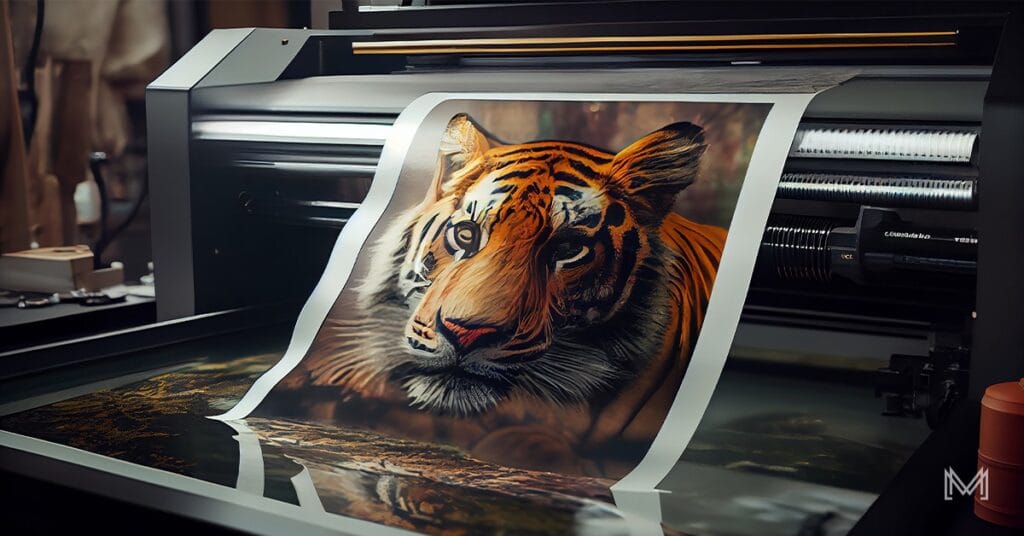Printing Your Way to Profit: A Guide to Starting a Printing Business in South Africa
There are opportunities for business owners who have a keen eye for detail and a love for creating high-quality printed goods in South Africa’s printing sector, which is a busy hotbed of creativity and innovation. Starting a printing business in South Africa may be a rewarding endeavour, regardless of whether you have the goal of establishing a full-fledged print shop or specialising in specialised services such as printing on t-shirts. This book will provide you with the essential knowledge and strategies to navigate the captivating printing industry and position your business for success.
The exciting world of printing
The printing industry continues to be an important contributor to South Africa’s economy, as it caters to the requirements of a diverse variety of enterprises, people, and organisations. There is a high demand for printing materials, and we expect this need to continue growing. This includes anything from eye-catching signage that attracts attention to personalised stationery that adds a touch of professionalism. One of the most attractive aspects of the printing sector is its adaptability, which allows it to meet a wide range of requirements and provides a multitude of opportunities for specialisation.

Choosing Your Specialty Market: A Strategic Beginning
Firstly, it’s crucial to identify your niche, which is your unique selling proposition that sets you apart from other businesses in the printing industry, before venturing fully into the industry. Take into account things like:
- Target Market: Who are your ideal customers? Are you targeting businesses, individuals, or specific industries?
- Service Offering: Will you specialise in digital printing, offset printing, large format printing, or a combination of services?
- Geographic Focus: Will you cater to a specific region, or will your reach extend across South Africa?
Here are some popular printing niches in South Africa:
- T-shirt printing: This booming niche capitalises on the ever-growing demand for personalised clothing, offering opportunities for creative expression and branding.
- Signage Printing: From billboards and banners to vehicle wraps and shop signs, this niche caters to businesses and individuals seeking to make a visual impact.
- Promotional Printing: This niche focuses on marketing materials, including flyers, brochures, business cards, and promotional items, which is crucial for businesses seeking to reach their target audience.
- Digital Printing: Digital printing offers high-quality, on-demand printing for a range of applications, including book printing, photo printing, and personalised stationery.
- Offset Printing: Often used for magazines, brochures, and packaging, offset publishing is renowned for its sharp detail and high-volume printing capabilities, making it ideal for large-scale projects.
Setting Up Your Printing Business: The Essential Ingredients
Once you’ve determined your niche, you’ll need to put together the necessary resources and infrastructure to launch your business. Here’s a step-by-step guide to get you started:
1. Legal Foundations: Registering Your Business
- Company Registration: Choose the most suitable legal structure for your business, considering factors like liability and taxation. You can opt for a sole proprietorship, partnership, close corporation, or private company.
- Registration with CIPC: The Companies and Intellectual Property Commission (CIPC) is responsible for registering businesses in South Africa. Visit their website (www.cipc.co.za) to learn about the specific requirements and procedures for your chosen business structure.
- Tax Registration: Register with the South African Revenue Service (SARS) to obtain a Tax Reference Number (TRN) and comply with tax regulations.
- Business Banking: To manage your finances efficiently, set up a business bank account.

2. Location, Location, Location: Finding Your Perfect Place
- Accessibility and Visibility: Your location should be easily accessible to customers and ideally visible from the street, especially if you’re offering walk-in services.
- Rent and Lease Agreements: Negotiate favourable lease agreements and carefully review terms related to rent, utilities, and potential renovation costs.
- Zoning Regulations: Ensure that your chosen location is zoned for commercial use and meets all necessary regulations.
3. Essential Equipment: Investing in Quality
- Your printing press, the heart of your printing operation, is a major investment.Choose a press that matches your niche and printing volume. Consider options like digital presses, offset presses, or specialised presses for t-shirt printing.
- Finishing Equipment: Equip your business with the necessary finishing equipment to add value to your printed materials. This can include paper cutters, laminators, binders, and die-cutting machines.
- A reliable computer system is essential for managing customer orders, designing layouts, and running business operations.
- Software: Consider investing in software tools to streamline your design processes, manage inventory, and track financial records.
4. Marketing and Branding: Reaching Your Audience
- Build a Strong Brand Identity: Develop a memorable brand name, logo, and visual style that resonates with your target market.
- Website and Online Presence: Develop a professional website that showcases your services, portfolio, and contact information.
- Social Media Marketing: Leverage the power of social media platforms to reach potential customers, share your work, and engage with your audience.
- Networking and Building Relationships: Attend industry events, join relevant business associations, and build relationships with potential clients.
- Local Advertising: To reach your target audience, consider advertising options like flyers, brochures, or print ads in local publications.
5. Operational Excellence: Streamlining Processes
- Production Workflow: Establish a clear and efficient workflow for handling customer orders, managing production, and delivering printed materials.
- Implement strict quality control measures to ensure that all printed materials meet your standards.
- Customer Service: Provide excellent customer service to foster positive relationships and encourage repeat business.
- Inventory Management: Develop an efficient inventory system to track your printing supplies, ensure timely replenishment, and minimise waste.

The Challenges and Rewards of Printing
Starting a printing business in South Africa presents a unique set of challenges and rewards. Here are some important considerations:
Challenges:
- Competition: The printing industry is competitive, with established players and new entrants. You’ll need to differentiate yourself through your services, quality, and customer experience.
- Investment Costs: Setting up a printing business requires a significant investment in equipment, software, and operating costs.
- Technological Advancements: The printing industry is constantly evolving with new technologies and printing processes. Staying ahead of the curve is essential for remaining competitive.
- Environmental Concerns: The printing industry has an environmental impact. Consider implementing sustainable practices to minimise waste and promote responsible printing.
Rewards:
- Creativity and Innovation: Printing offers opportunities to unleash your creativity and bring designs to life.
- Building a Business: You have the opportunity to build a successful and fulfilling business, providing a valuable service to your community.
- Customer Satisfaction: There’s immense satisfaction in delivering high-quality printed materials that meet customer expectations.
- Potential for Growth: The printing industry offers opportunities for expansion, such as adding new services, expanding your client base, or opening additional locations.
The future of printing
Trends like these are driving the printing industry’s continued growth and evolution.
- Personalisation: Consumers increasingly demand personalised products, from t-shirts to packaging. Printing businesses can cater to this trend by offering customisation services.
- Digital Transformation: The adoption of digital printing technologies offers faster turnaround times, greater flexibility, and cost-effectiveness, making it an attractive option for many businesses.
- Sustainability: Customers and businesses are increasingly conscious of their environmental impact. Printing businesses can differentiate themselves by adopting eco-friendly practices and offering sustainable printing options.
- Technology Integration: Printing is becoming more integrated with other technologies, such as augmented reality (AR), virtual reality (VR), and 3D printing, creating exciting opportunities for innovation.
Your success story awaits.
Starting a printing business in South Africa requires a strong commitment to quality, customer service, and innovation. By carefully planning, investing in the right equipment, and embracing the latest trends, you can create a thriving business that delivers exceptional value to your clients and contributes to the growth of the printing industry in South Africa. Keep in mind that the foundation of printing success is passion, dedication, and a commitment to excellence.

Frequently Asked Questions – Printing Business
1. How much money do I need to begin a printing business in South Africa? The amount of money you need to start a printing business depends on your region, the type of business you want to run, and the tools you need. A small digital printing press, a computer, and some simple finishing tools could set you back between R100,000 and R200,000. A bigger business with an offset printing press, specialised tools, and a storefront, on the other hand, might need a much bigger investment—possibly more than R1 million. If you need to, make a detailed budget and look for ways to get money, such as loans or partners.
2. What do I need to do legally to start a printing business in South Africa? You’ll need to tell the Companies and Intellectual Property Commission (CIPC) about your business and pick a formal structure, such as a sole proprietorship, partnership, close corporation, or private company of your choice. In addition, you must apply for a Tax Reference Number (TRN) with the South African Revenue Service (SARS) and follow all tax rules. You might want to get business insurance to protect yourself from possible lawsuits.
3. How do I get people to buy from my printing business? Marketing is a crucial part of attracting people. Create a successful website and online profile, use social media, go to events in your field, and meet people who might become clients. Think about using flyers or print ads to advertise in your area. Set affordable prices, put quality first, and build strong ties with customers to encourage them to buy from you again.
4. When running a printing business, what should you know about the environment? The printing business has an effect on the world, so it’s important to encourage responsible printing and cut down on waste. Think about using recycled paper, switching to eco-friendly inks, using less energy, and reusing as much as you can. To attract clients who care about the environment, offer printing options that are environmentally friendly.
5. What do you think South Africa’s print industry will do in the future? The printing business is always changing. Trends to monitor include personalisation, digital printing, environmental sustainability, and the integration of technology. To stay ahead of the curve and attract clients looking for cutting-edge solutions, you might want to invest in new tools and come up with new ways to print.

